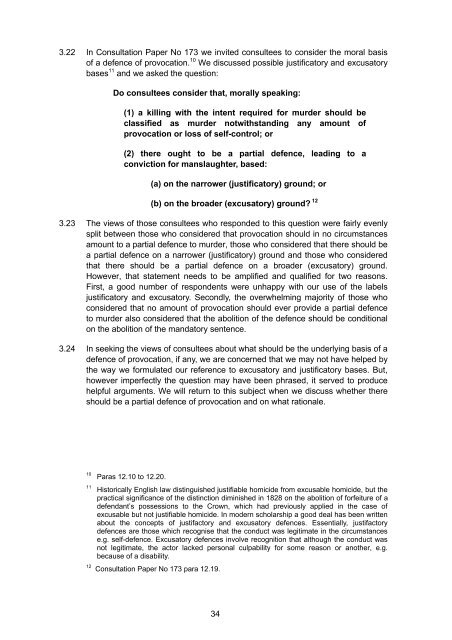lc290 Partial Defences to Murder report - Law Commission
lc290 Partial Defences to Murder report - Law Commission
lc290 Partial Defences to Murder report - Law Commission
You also want an ePaper? Increase the reach of your titles
YUMPU automatically turns print PDFs into web optimized ePapers that Google loves.
3.22 In Consultation Paper No 173 we invited consultees <strong>to</strong> consider the moral basis<br />
of a defence of provocation. 10 We discussed possible justifica<strong>to</strong>ry and excusa<strong>to</strong>ry<br />
bases 11 and we asked the question:<br />
Do consultees consider that, morally speaking:<br />
(1) a killing with the intent required for murder should be<br />
classified as murder notwithstanding any amount of<br />
provocation or loss of self-control; or<br />
(2) there ought <strong>to</strong> be a partial defence, leading <strong>to</strong> a<br />
conviction for manslaughter, based:<br />
(a) on the narrower (justifica<strong>to</strong>ry) ground; or<br />
(b) on the broader (excusa<strong>to</strong>ry) ground? 12<br />
3.23 The views of those consultees who responded <strong>to</strong> this question were fairly evenly<br />
split between those who considered that provocation should in no circumstances<br />
amount <strong>to</strong> a partial defence <strong>to</strong> murder, those who considered that there should be<br />
a partial defence on a narrower (justifica<strong>to</strong>ry) ground and those who considered<br />
that there should be a partial defence on a broader (excusa<strong>to</strong>ry) ground.<br />
However, that statement needs <strong>to</strong> be amplified and qualified for two reasons.<br />
First, a good number of respondents were unhappy with our use of the labels<br />
justifica<strong>to</strong>ry and excusa<strong>to</strong>ry. Secondly, the overwhelming majority of those who<br />
considered that no amount of provocation should ever provide a partial defence<br />
<strong>to</strong> murder also considered that the abolition of the defence should be conditional<br />
on the abolition of the manda<strong>to</strong>ry sentence.<br />
3.24 In seeking the views of consultees about what should be the underlying basis of a<br />
defence of provocation, if any, we are concerned that we may not have helped by<br />
the way we formulated our reference <strong>to</strong> excusa<strong>to</strong>ry and justifica<strong>to</strong>ry bases. But,<br />
however imperfectly the question may have been phrased, it served <strong>to</strong> produce<br />
helpful arguments. We will return <strong>to</strong> this subject when we discuss whether there<br />
should be a partial defence of provocation and on what rationale.<br />
10 Paras 12.10 <strong>to</strong> 12.20.<br />
11 His<strong>to</strong>rically English law distinguished justifiable homicide from excusable homicide, but the<br />
practical significance of the distinction diminished in 1828 on the abolition of forfeiture of a<br />
defendant’s possessions <strong>to</strong> the Crown, which had previously applied in the case of<br />
excusable but not justifiable homicide. In modern scholarship a good deal has been written<br />
about the concepts of justifac<strong>to</strong>ry and excusa<strong>to</strong>ry defences. Essentially, justifac<strong>to</strong>ry<br />
defences are those which recognise that the conduct was legitimate in the circumstances<br />
e.g. self-defence. Excusa<strong>to</strong>ry defences involve recognition that although the conduct was<br />
not legitimate, the ac<strong>to</strong>r lacked personal culpability for some reason or another, e.g.<br />
because of a disability.<br />
12 Consultation Paper No 173 para 12.19.<br />
34

















